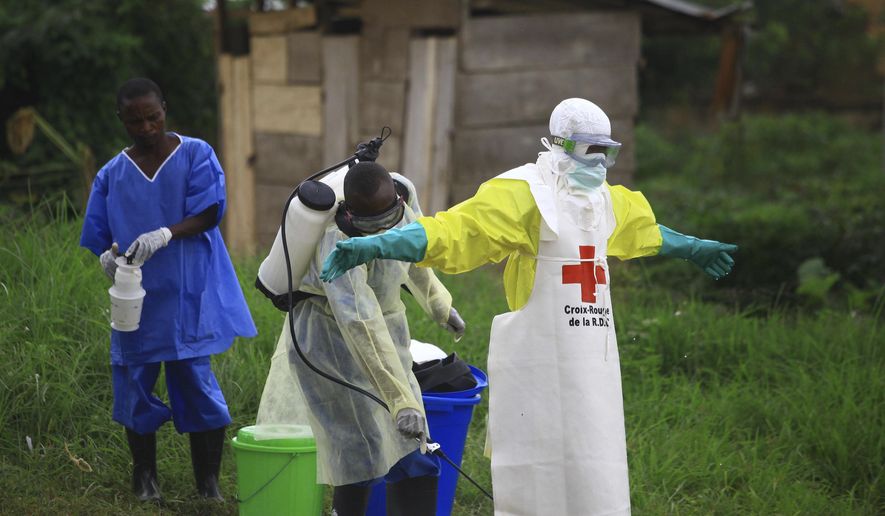An investigational treatment that stifles Ebola proteins is safe and easy to use, the National Institutes of Health announced Friday, underscoring its potential in the fight against a thorny epidemic in the Democratic Republic of Congo.
Anthony Fauci, director of NIH’s infectious-disease research, said indicators from early tests in Maryland formed the basis for administering the treatment, known as mAb114, to actual Ebola patients in the DRC.
Officials in Africa are deploying it as part of a randomized trial with three other groundbreaking therapies, to see which one works best.
Though it’s already in use, the phase-1 trial results published in The Lancet journal on Friday will help the public understand that mAb114 is a safe treatment, Dr. Fauci told The Washington Times in a phone interview.
Eighteen adults who received the infusions at a clinical center in Bethesda received it well, and only four reported mild side effects such as joint pain or headaches.
Moving forward, scientists will discern whether the drug can actually eradicate Ebola in humans, since the randomized trial has just gotten underway in the DRC.
Dr. Fauci is optimistic.
“The animal model was really pretty striking,” he said.
Scientists said mAb114, in particular, offers a number of advantages.
It is easy to administer, and it is formulated in a freeze-dried powder that doesn’t have to be kept in freezer storage. It is reconstituted with water and added to a saline solution before infusions.
That’s a plus in places like the DRC, where outbreaks tend to occur in isolated provinces.
For instance, responders said it was difficult to transport a trial vaccine at sub-zero temperatures amid a separate DRC outbreak earlier this year. The areas were mostly accessible by motorbike, forcing global responders to set up an intricate system of airlifts.
The mAb114 treatment consists of an antibody that binds to a core receptor in the surface protein of the Zaire ebolavirus, thwarting the disease from infecting human cells, according to NIH.
Scientists isolated the antibody from a person who survived the 1995 Ebola outbreak in the DRC.
“The person was making good antibodies to Ebola because he recovered from Ebola,” Dr. Fauci said.
NIH scientists were able to clone the antibody, manufacture it in large quantities and transfuse it into others.
Ebola is a serious, often-fatal disease that is transmitted to people from wild animals and spreads from human to human through the bodily fluids of people who exhibit symptoms.
The ongoing outbreak in northeastern DRC has resulted in 715 cases and more than 440 deaths.
The latest cluster of cases centers on Katwa and Butembo, a pair of cities that are home to more than 1 million people, the World Health Organization reported Friday.
Responders have been contending with “pockets of community mistrust” in the area, and cases have been reported south of that hotspot in the Kayina health zone, a high-risk area of this war-torn part of the DRC.
“Teams are working actively to build community trust and scale up response activities around these new clusters,” WHO said in its weekly update.
The outbreak is the worst on record after the West African outbreak that killed more than 11,000 people earlier this decade.
• Tom Howell Jr. can be reached at thowell@washingtontimes.com.




Please read our comment policy before commenting.